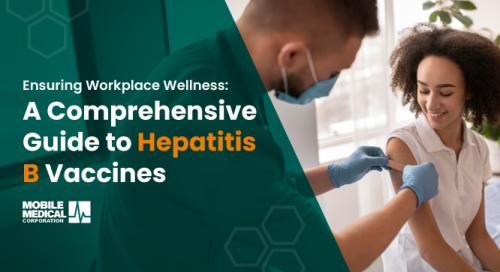Protecting your employees doesn't just mean safeguarding against workplace accidents — it also means protecting them from infectious diseases. One of these diseases, hepatitis B, can quickly spread through the workplace without the necessary precautions. There are two steps an employer can take to stop this: minimize employee exposure to blood or other potentially infectious material (OPIM), and ensure that employees are fully vaccinated per the latest OSHA hepatitis b requirements.
What is Hepatitis B?
Hepatitis B, also known as HBV, is a virus that attacks the liver. Symptoms include fever, nausea, loss of appetite, vomiting, abdominal pain, joint pain, and jaundice. HBV comes in two forms: a short-term illness that lasts for several weeks (referred to as "acute" hepatitis) and a lifelong infection (known as "chronic" hepatitis). While symptoms are less common to those suffering from chronic HBV, this form can also lead to liver cirrhosis, liver cancer, and death.
Both forms of HBV spread through infected bodily fluids, such as blood and saliva. This means it can pass through sharing personal objects, touching open wounds, or coming into contact with stained items, such as bloodied laundry. An infected individual can spread the virus even if they aren't showing symptoms. While antiviral medications are an effective treatment for hepatitis b, it's better to avoid infection altogether. To do so, one must receive a full series of hepatitis B vaccinations.
OSHA Regulations Regarding Hepatitis B
Because hepatitis B can spread through bodily fluids, even when an individual isn't presenting symptoms, employers must follow protocol and safeguard employees against infection, as outlined by the OSHA bloodborne pathogens standard.
According to OSHA regulations, all employees who are at risk of occupational HBV exposure must be offered a full series of HBV vaccinations by their employer. These vaccines must come at no cost to the employee and take place in a reasonable location and time frame. If the employee declines the vaccination, they must fill out the appropriate declination form. However, if the employee later chooses to accept the vaccination, it must be provided by the employer at no cost.
Hepatitis B Vaccine Schedule
Hepatitis B vaccines come in several dose options. The most common schedule is a three-dose series. While this series is preferably started at birth, it's been approved for both children and adults. The first two doses are delivered a month apart, with the final dose delivered after an additional six months.
There's also an option for a two-dose series. The doses are administered a month apart, allowing for vastly faster completion rates. This series is approved for those over the age of 18.
Finally, the HBV vaccine can be offered as an accelerated four-dose series. This typically involves receiving three vaccinations within two months and the final, fourth dose after one year. While this series involves more injections, it speeds up short-term protection, with the fourth dose providing maximum long-term protection.
How Long Does a Hepatitis B Vaccine Last?
A full series of HBV vaccinations protects against HBV for at least 20 years, if not for life. Most people will not need a follow-up injection after they've completed their first series. However, if you're exposed to the virus, it can be beneficial to receive a hepatitis B vaccine "booster". If you're at high risk of infection due to occupation or other factors, you should receive a booster approximately five years after the initial series.
Hepatitis B Vaccine Side Effects
As with any vaccine, it's normal to experience mild side effects after receiving the HBV vaccine, such as soreness at the injection site, headache, fever, or fatigue. In rare cases, you may have an allergic reaction to the vaccine. If you or someone you know experiences symptoms of an allergic reaction, such as swelling, hives, or difficulty breathing, call 911 immediately.
Contrary to some misconceptions, vaccines do not cause disease. Studies linking vaccines to autism or HIV achieved their results through speculation and improper testing and have since been debunked.
Stay Protected with MMC
Whether acute or chronic, hepatitis B poses a serious threat to an unprotected employee. If you're in need of conveniently located medical services, contact Mobile Medical Corporation. Our on-site clinics offer full vaccination services for crew and administration, whether it be a hepatitis booster, yearly flu shot, or other necessary injections. Contact MMC today and keep your employees safe.



